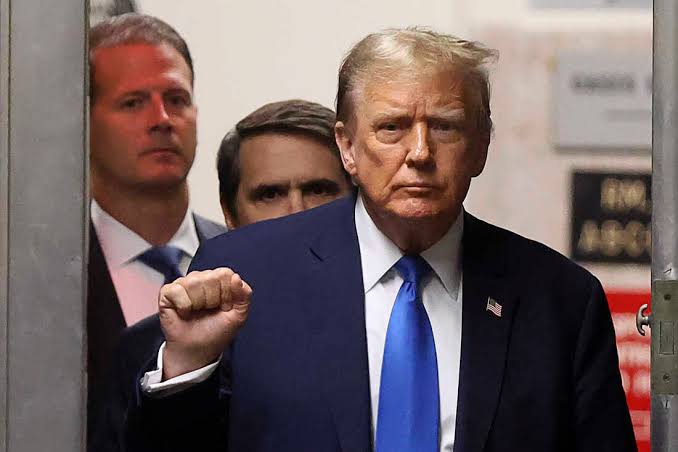
Trump’s Argument for Total Immunity: America’s Founders Did not Want a King!
In the ensuing two centuries, SCOTUS has further established parameters around presidential powers. For instance, in United States v. Nixon, Richard Nixon argued that executive privilege afforded the president a right to withhold ‘sensitive information’ – in this case audio tapes of recorded conversations pertaining to the Watergate Scandal
President Donald Trump’s political career has been marked by bombastic rhetoric that has challenged America’s existing political and social structures . Through his incendiary discourse, Trump has provoked political violence even though that may be unintended, as evidenced by the 2017 ‘Unite the Right’ rally in Charlottesville, VA, and the 6 January 2021 Capitol insurrection, where he rejected the results of the election where then-President-Elect Joe Biden was declared winner. In both instances, he failed to expressly and convincingly condemn those responsible for committing violence. Undoubtedly, this ultra-right strongman style of political discourse has redefined America’s political dialogue and reshaped the Republican Party. Now, Mr Trump has turned to the Supreme Court in a move that would radically redefine American democracy itself: an affirmation of total presidential immunity from the nation’s highest court. In other words, is the president above the law? This legal strategy is almost certainly fail.
Still, the former President’s pursuit of total presidential immunity presents several dangers. In the first instance, the Supreme Court’s decision to hear oral arguments has delayed the Department of Justice’s pending criminal case against Mr Trump for his alleged attempt to obstruct the 2020 presidential election. In a worst-case scenario, the case could be delayed until after the 2024 presidential election. Subsequently, Mr Trump’s potential return to the White House would, in effect, make the alleged election subversion case disappear – as President, he would have the power to fire his Attorney General, thus making the case disappear. As former Congresswoman Liz Cheney put it, ‘If delay prevents this Trump case from being tried this year, the public may never hear critical and historic evidence developed before the grand jury, and our system may never hold the man most responsible for Jan. 6 to account’. Cheney herself lost her congressional seat for acting as one of the few Congressional Republicans to vote in favour of Trump’s second impeachment, pertaining to his role in the 6 January 2021 Capitol insurrection.
Second, the Supreme Court’s ruling of total immunity for a sitting President would forever alter the role of presidential power and undermine the checks and balances that have long served as a hallmark of American Democracy. In response to Trump’s attorney, John Sauer’s argument for presidential immunity, Associate Justice Ketanji Brown Jackson stated, ‘If someone with those kind of powers – the most powerful person in the world, with the greatest amount of authority – could go into office knowing that there would be no potential penalty for committing crimes, I’m trying to understand what the disincentive is for turning the Oval Office into the seat of criminal activity in this country’. So too, Ms Jackson has expressed concern over remarks made by some of her conservative colleagues. For instance, Associate Justice Samuel Alito proposed a hypothetical scenario in which a President loses a ‘hotly contested election’ and must therefore fear criminal prosecution once his political opponent takes office.
The Supreme Court’s ruling of total immunity for a sitting President would forever alter the role of presidential power and undermine the checks and balances that have long served as a hallmark of American Democracy.
The prevailing question throughout this process is the degree of immunity afforded to a president acting in his official capacity as the Commander-in-Chief. Such would be the case in instances of a president exercising veto and pardon power, for instance. Yet, Mr Sauer has a made a bold claim: Trump was merely acting within his role as president when he asked Arizona House Speaker Rusty Bowers to arrange a hearing on election fraud.
In principle, Trump’s pursuit of total criminal immunity appears unlikely to succeed and serves as more of a stall tactic to dampen some of his legal woes ahead of the upcoming 2024 election. Still, he presents a bold claim about the scope of presidential authority: ‘A president has to have immunity. If you don’t have immunity, you have a ceremonial president’. Such logic implies America’s founders envisioned a president who enjoys nearly unlimited powers. This is simply not the case. In the study of the American presidency, one fact is clear: the degree of power afforded to the president has evolved over time. Past court rulings have, indeed, placed parameters around presidential powers. Notably, Mr Trump’s legal team has cited Marbury v. Madison (1803) – one of the most consequential Supreme Court rulings in American history – to argue that a President’s official acts “can never be examinable by the courts”.
For historical context, Marbury v. Madison was a landmark Supreme Court case that established the principle of judicial review. John Adams, in the waning days of his presidency, appointed a series of justices of the peace for the District of Columbia. The justice’s commissions were approved by the Senate and signed by then-President Adams, affixed with the official seal of the government. Yet upon entering office, Thomas Jefferson ordered his Secretary of State, James Madison, not to deliver the commissions. One appointee, William Marbury, petitioned the Supreme Court to order Madison to show cause why the commission should not be delivered. Marbury was ultimately denied his commission. However, Marbury v. Madison continues to influence American jurisprudence to this day. Chief Justice John Marshall stated, ‘A law repugnant to the Constitution is void’. According to the ruling, the President “is so far the officer of the law (and) is amenable to the law for his conduct”.
In the ensuing two centuries, SCOTUS has further established parameters around presidential powers. For instance, in United States v. Nixon, Richard Nixon argued that executive privilege afforded the president a right to withhold ‘sensitive information’ – in this case audio tapes of recorded conversations pertaining to the Watergate Scandal. The Court unanimously ruled against Nixon. Chief Justice Warren Burger stated, “…when the ground for asserting privilege as to subpoenaed materials sought for use in a criminal trial is based only on the generalized interest in confidentiality, it cannot prevail over the fundamental demands of due process of law in the fair administration of criminal justice”. In essence, Mr Nixon was not above the law.
However, Nixon v. Fitzgerald (1982) settled the matter of whether or not a president can be sued for damages while in office – he cannot. Still, Clinton v. Jones (1997) made clear that President Bill Clinton could be sued for sexual advances that occurred prior to his presidency. Contrary to President Trump’s legal argument, courts can – and have – sat in judgement of a President’s official acts. During the 1930s, the Supreme Court sought to restrict aspects of President Franklin Roosevelt’s New Deal. In 1937, FDR sought to create a court more amenable to his policies through the Judicial Procedures Reform Bill – effectively allowing the President to add six new Justices to the bench. However, the bill was unsuccessful. More recently, Biden v. Nebraska (2023) determined that President Joe Biden did not have the legal authority to cancel $400 billion in student debt. Each of these cases demonstrated the president was subject to the rule of law.
Contrary to President Trump’s legal argument, courts can – and have – sat in judgement of a President’s official acts.
Donald Trump and his attorneys are stringing together a series of arguments in a convoluted legal battle that no self-respecting Court would entertain. Moreover, the argument for full immunity illustrates a presidency anathema to American democracy. Trump embodies a radical authoritarian who resembles more a king than an elected official – an ironic, and terrifying, idea when we consider the basis for the United States’ founding. Here, democracy’s vulnerabilities become evident.
On one hand, Trump’s legal challenge, however far-fetched, has the potential to redefine the power of the presidency in unimaginable ways; on the other, he will potentially avoid accountability for his role in the Capitol riot (among other charges) by delaying a potential trial beyond November’s election. Both are unfortunate prospects that will weaken American democracy in the long term and reshape the nation’s role in the world. Mr Trump’s understanding of American history – and jurisprudence – is revisionist, at best, detrimental at worst. In the process, he is manipulating the court for his own purposes – transforming it into a plaything to get what he wants. Above all, Trump seems to have forgotten the most basic principle of American history: the founders did not want a king.
___________________________
Dr Alex Sessa is a Sixteenth Council Senior Fellow
Works Cited
Liz Cheney, ‘Liz Cheney: The Supreme Court Should Rule Swiftly on Trump’s Immunity Claim’, The New York Times, Opinion, 22 April 2024, https://www.nytimes.com/2024/04/22/opinion/trump-immunity-supreme-court.html, accessed Saturday 27 April 2024 at 16:30 BST.
Will Dunham, ‘At US Supreme Court, clashing views on presidential immunity, Reuters, 25 April 2024, https://www.reuters.com/legal/us-supreme-court-clashing-views-presented-presidential-immunity-2024-04-25/, accessed Saturday 27 April 2024 18:30 BST.
Alan Feuer, ‘How a Supreme Court Ruling Could Affect Trump’s Election Case’, The New York Times, 26 April 2024, https://www.nytimes.com/2024/04/26/us/politics/trump-supreme-court-immunity.html, accessed Saturday 27 April 2024 at 18:30 BST.
Brian D. Griffiths, ‘Justice Ketanji Brown Jackson warns of the Oval Office turning into a “crime center” if Trump gets the sweeping immunity he wants’, Business Insider, 25 April 2024, https://www.businessinsider.com/justice-jackson-trump-immunity-oval-office-criminial-activity-supreme-court-2024-4, accessed Saturday 27 April 2024 at 18:30 BST.
Ketanji Brown Jackson (Associate Justice of the United States Supreme Court), Supreme Court of the United States, Transcript, Donald Trump (Petitioner) v. United States (Respondent), No. 23-939, 24 April 2024, Washington, D.C., https://www.supremecourt.gov/oral_arguments/argument_transcripts/2023/23-939_f2qg.pdf, accessed Saturday 27 April 2024 at 18:00 BST.
Donald Trump (Petitioner) v. United States (Respondent), No. 23-939, Brief of Petitioner Donald J. Trump, 19 March 2024, https://www.supremecourt.gov/DocketPDF/23/23-939/303418/20240319150454815_23-939%20-%20Brief%20for%20Petitioner.pdf, accessed Tuesday 30 April 2024 at 19:00 BST.
Wayne Unger, ‘How Trump’s lawyers would fail my constitutional law class with their Supreme Court brief on criminal immunity’, The Conversation, 2 April 2024, https://theconversation.com/how-trumps-lawyers-would-fail-my-constitutional-law-class-with-their-supreme-court-brief-on-criminal-immunity-226388, accessed Tuesday 30 April 2024 at 19:00 BST.
‘How FDR lost his brief war on the Supreme Court’, The National Constitution Center, 5 February 2024, https://constitutioncenter.org/blog/how-fdr-lost-his-brief-war-on-the-supreme-court-2, accessed Wednesday 1 May 2024 at 21:00 BST.
‘Looking back: The Supreme Court decision that ended Nixon’s Presidency,’ The National Constitution Center, 24 July 2023, https://constitutioncenter.org/blog/anniversary-of-united-states-v-nixon, accessed Wednesday 1 May 2024 at 21:00 BST.
‘Nixon v. Fitzgerald, 457 U.S. 721’, U.S. Supreme Court, 24 June 1982, Justia U.S. Supreme Court, https://supreme.justia.com/cases/federal/us/457/731/, accessed Wednesday 1 May 2024 21:00 BST.



